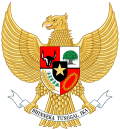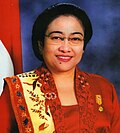| Position | Portrait | Name |
|---|
|
|
| Coordinating Minister of Politics and Security |  | Susilo Bambang Yudhoyono
(until 12 March 2004) |
 | Hari Sabarno
(ad interim; since 12 March 2004) |
| Coordinating Minister for the Economy |  | Dorodjatun Kuntjoro-Jakti |
| Coordinating Minister for People's Welfare |  | Jusuf Kalla
(until 19 April 2004) |
 | Abdul Malik Fadjar
(ad interim; since 22 April 2004) |
|
| Minister of Foreign Affairs |  | Hassan Wirajuda |
| Minister of Home Affairs |  | Hari Sabarno |
| Minister of Justice and Human Rights |  | Yusril Ihza Mahendra |
| Minister of Industry and Trade |  | Rini Soemarno |
| Minister of Energy and Mineral Resources |  | Purnomo Yusgiantoro |
| Minister of Finance |  | Boediono |
| Minister of Forestry |  | Mohamad Prakosa |
| Minister of Agriculture |  | Bungaran Saragih |
| Minister of Health |  | Achmad Sujudi |
| Minister of Social Affairs |  | Bachtiar Chamsyah |
| Minister of Education |  | Abdul Malik Fadjar |
| Minister of Religious Affairs |  | Said Agil Al Munawwar |
| Minister of Maritime Affairs and Fisheries |  | Rokhmin Dahuri |
| Minister of Transportation |  | Agum Gumelar
(until 24 May 2004) |
 | Soenarno
(ad interim; since 24 May 2004) |
| Minister of Manpower and Transmigration |  | Jacob Nuwa Wea |
| Minister of Culture and Tourism |  | I Gede Ardhika |
| Minister of Defense |  | Matori Abdul Djalil |
|
| State Minister of Cooperatives and Small and Medium Businesses |  | Alimarwan Hanan |
| State Minister of Environment |  | Nabiel Makarim |
| State Minister of Research and Technology |  | Hatta Rajasa
(until 29 September 2004) |
| State Minister of Administrative Reforms |  | Feisal Tamin |
| State Minister of Female Empowerment |  | Sri Redjeki Sumarjoto |
| State Minister of Eastern Indonesia Regional Development Acceleration |  | Manuel Kaisiepo |
| State Minister of State Owned Enterprises (BUMN) |  | Laksamana Sukardi |
State Minister of National Development Planning and
Chairperson of the National Development Planning Agency (Bappenas) |  | Kwik Kian Gie |
| State Minister of Communication and Information |  | Syamsul Mu'arif |
| State Minister of Settlement and Regional Infrastructure |  | Soenarno |
Officials with ministerial rank |
| Attorney General |  | Muhammad Abdul Rachman |
| State Secretary/ Cabinet Secretary |  | Bambang Kesowo |
| Chief of the National Intelligence Body (BIN) |  | Abdullah Mahmud Hendropriyono |
|




































